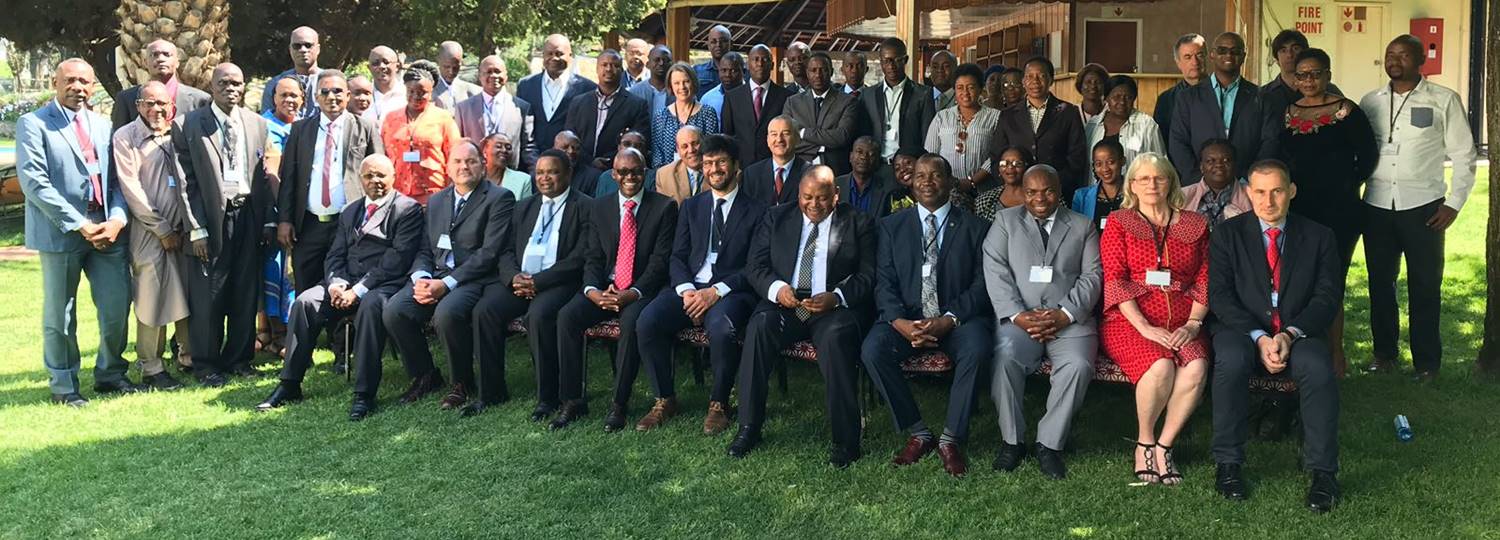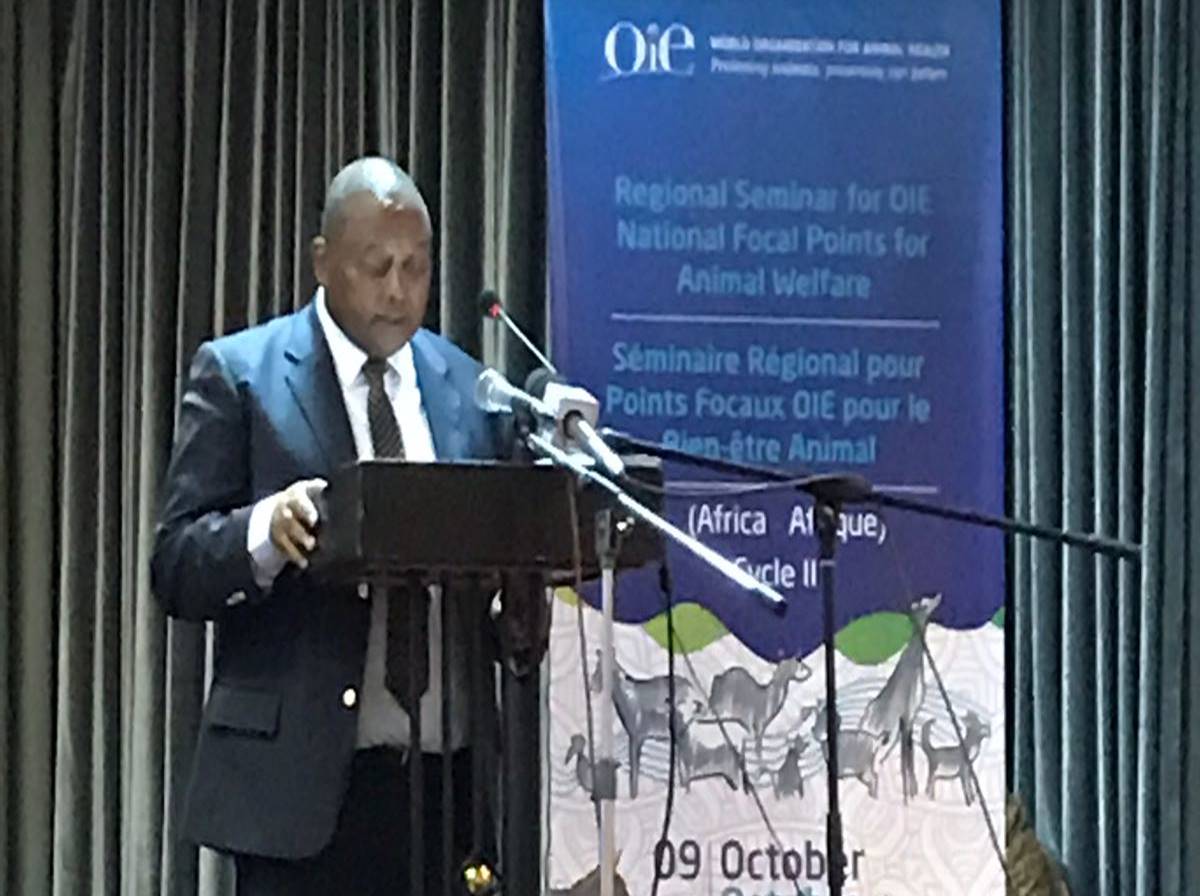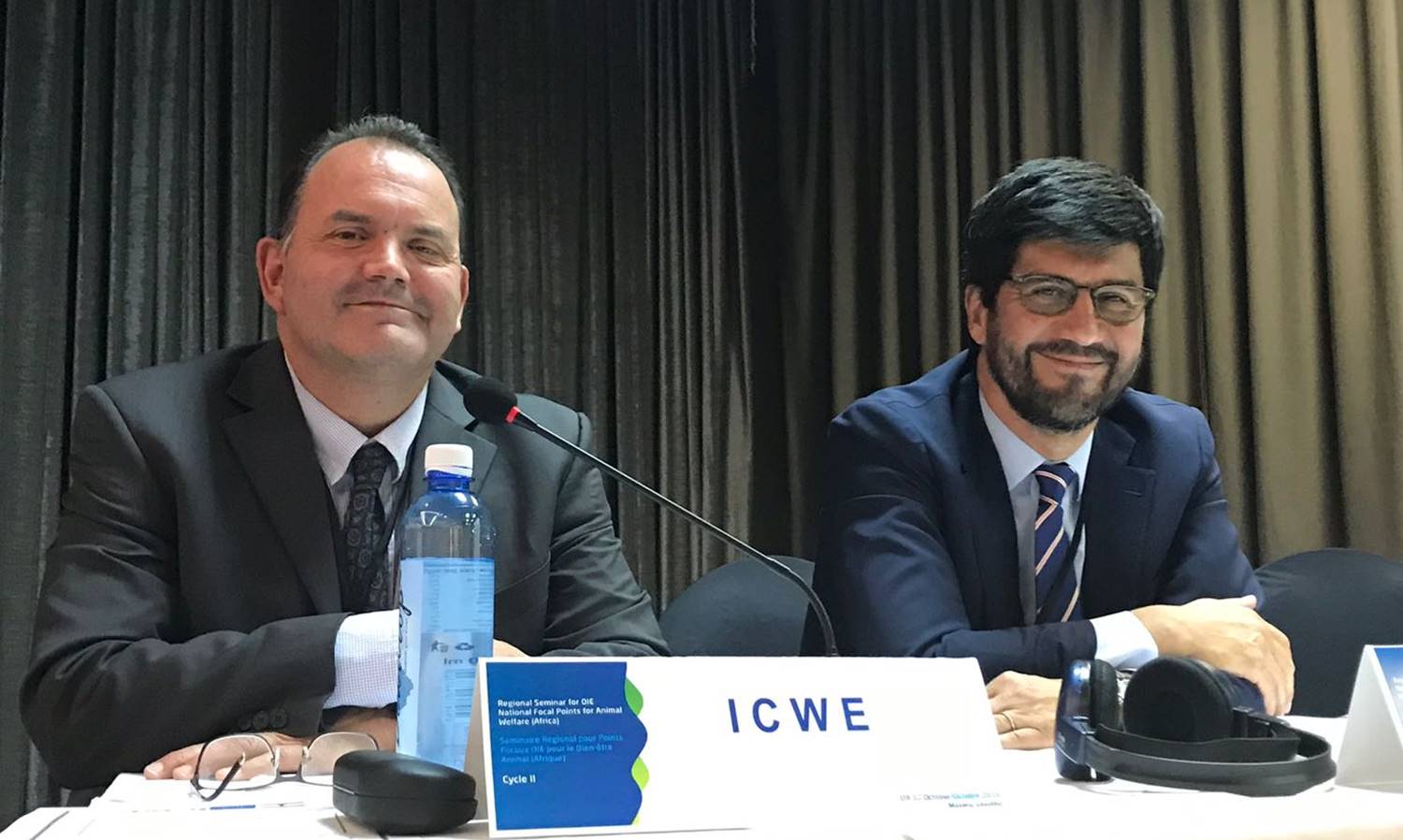
Minister of Agriculture and Food Security for Lesotho, Hon. Mahala Molapo, delivering the official opening address
The OIE has been running several training courses for OIE Focal Points (animal welfare, animal disease notification, aquatic animal diseases, veterinary laboratories, veterinary products, wildlife surveillance, etc.) since the early 2000s.
The training of National Focal Points (NFP) for animal welfare in Africa commenced in 2010 with a first (cycle) seminar organised for all focal points (Africa) in Addis Ababa, Ethiopia. In Africa, no further training courses were organised since then.
The OIE, with financial support from the European Union, organised a “Regional seminar of OIE Focal Points on Animal Welfare Animal (Cycle 2)” in Maseru, Lesotho from the 9 – 12 October 2018.
The training course was organised, with the logistical support from the Government of the Kingdom of Lesotho, through the Ministry of Agriculture and Food Security (MAFS). There was also a specific side-event co-sponsored and co-hosted by the International Coalition for Working Equids (ICWE). ICWE comprises four Non-Governmental Organisations i.e. World Horse Welfare, the Donkey Sanctuary, The Brooke and SPANA.
The overall objective of the seminar was to build capacity of OIE focal points on animal welfare to better assume their responsibilities and obligations as advisors to the OIE Delegates in their respective countries.
The workshop was officially opened by the Minister of Agriculture and Food Security, Hon. Mahala Molapo. He was accompanied by the Principal Secretary, Mr. Malefetsane Nchaka, Director of Livestock Services, Dr Keneuoe Lehloenya, and the Director of Veterinary Services (and OIE Delegate), Dr Gerard Mahloane. The Minister explained that Lesotho is a mountainous country, and that large animals such as equids (horses and donkeys) as well as cattle are used for transport and draught power in most areas of the country. In addition the country is known for wool and mohair production, requiring that the producing sheep and goat breeds and must be looked after well. He commended the OIE for taking the lead in ensuring animal welfare by developing standards in this subject and training veterinary staff (National Focal Points, NFP) from the entire African continent on animal welfare. He also talked about the so-called “private standards” which – as he argued – some countries are using as trade barriers and implored the OIE to assist.
Drs Kevin Brown (ICWE) and Leopoldo Stuardo (OIE). Picture © K. Mpedi (oie) 2018
The meeting started with the OIE work on standards for animal welfare, and went into presentation by selected focal points narrating their experiences implementing animal welfare standards in their countries. These were followed by in-depth science of animal behaviour and animal welfare. There were also practical sessions to expose participants to real-life situations involving animal welfare.
Group photograph. Picture © K. Mpedi (oie) 2018
The OIE team explained the Organisation and its core mandate of animal health, welfare, and veterinary public health, with particular reference to the role of focal points for animal welfare and the need to support the OIE Delegate, emphasising the importance of the training. National Focal Points (NFP) for animal welfare were called on to take responsibility, take the lead on animal welfare matters in their respective countries and use the learnings from this workshop to improve their understanding of the subject. OIE international standards on the welfare of animals during production, transport, slaughter, experimentation, etc. were explained in detail.
A broad selection of species including large production animals, dogs, working equids, research animals and reptiles were covered. A representative from the African Union (AU-IBAR) presented the Animal welfare strategy for Africa(AWSA) and corresponding Action Plan.
The training was facilitated by world renowned experts, mostly from OIE and its Reference Centres, as well as from Non-Governmental Organisations dealing with animal welfare in the region and globally; these included theDepartment of Companion Animal Clinical Studies at the University of Pretoria (South Africa), the Istituto Zooprofilattico Sperimentale dell’Abruzzo e del Molise “G. Caporale” (ISZAM) [ ] in Teramo (Italy), the School of Veterinary Science of the Universidad Autonoma de Barcelona (UAB), in Barcelona (Spain), the National School of Veterinary Medicine (ENMV) in Sidi Thabet (Tunisia), the Institute of Agrifood Research and Technology (IRTA) in Barcelona (Spain), the International Coalition for Working Equids (ICWE) and others : the Inter-african Bureau for Animal Resources (AU-IBAR), the Inter-Governmental Authority for Development (IGAD), Vétérinaires Sans Frontières (VSF) Germany, World Animal Protection, etc.
The International Coalition for World Equids (ICWE) partnered with OIE to deliver a full day of awareness raising on the welfare of working. Dr Leopoldo Stuardo (OIE Paris) kicked off the day with a presentation on the new OIE Chapter 7.12 on the welfare of working equids, which has eight outcome measurements: behaviour, body condition score, morbidity, mortality, handling response, lameness, complications due to management and fitness to work. Dr Marosi Molomo (Lesotho, former Member of the OIE Working Group on Animal Welfare) gave a presentation on future challenges in the implementation of these OIE standards on the welfare for working equids in the African region. Participants then had the opportunity to have a practical session in the field on some of the work that members of ICWE (specifically World Horse Welfare) does in Lesotho – notably a clinic for equids which offers treatment at no cost to equids owners. Amongst others, they learned about the working equids animal welfare assessment tool which is used to assess a group of equids for behaviour, body condition score, movement, harness injury etc.
The meeting was officially closed by the Deputy Principal Secretary of Lesotho, on behalf of the Assistant Minister of Agriculture and Food Security



